“Television is pretty awful at the moment,” said Eileen Atkins the other week. “Is that because I'm getting old?” Age wouldn’t dare to wither Dame Eileen, of course, who has just bounced back in fine sparky fettle in the BBC's remake of Upstairs Downstairs.
She’s right – lots of television is awful. Always has been. On the other hand, there's now so much of it on so many channels that with a bit of judicious schedule-surfing and deft deployment of the various on-demand services now available, you can almost certainly find enough worthwhile stuff to stretch through the week. Also, it's harder to make value judgements about television than about most other art forms, because it isn't just an art form. It's full of news, sport, gossip, shopping channels, game shows and all kinds of cheap filler, so deciding where the "art" part begins is hugely subjective.
Besides, part of the charm of TV is the way it's prey to the “so bad it's good” syndrome. The X Factor – is it a brilliant innovation in programming, an outrageous monopolistic coup by Simon Cowell, or 21st-century bear-baiting? The Only Way is Essex – crass and chavtastic, hysterically entertaining, or condescending cultural voyeurism?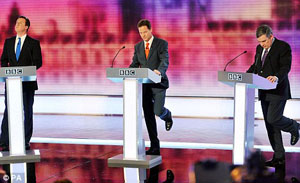 Flicking back through 2010, world-changing TV events are in short supply, even if the year did bring the tumultuous arrival of televised election debates, which we were told would change the face of British politics forever (Dave, Cleggie and Gordo do the hokey-cokey, pictured right). It's more likely that their impact will be as illusory as the outbreak of Cleggmania that was triggered by the first debate, only to vanish like Bernie Madoff's billions on polling day. But apart from Panorama screwing up the World Cup bid, and Frankie Boyle burning down what's left of Western civilisation with his Channel 4 show Tramadol Nights, disruption and anarchy were scarce.
Flicking back through 2010, world-changing TV events are in short supply, even if the year did bring the tumultuous arrival of televised election debates, which we were told would change the face of British politics forever (Dave, Cleggie and Gordo do the hokey-cokey, pictured right). It's more likely that their impact will be as illusory as the outbreak of Cleggmania that was triggered by the first debate, only to vanish like Bernie Madoff's billions on polling day. But apart from Panorama screwing up the World Cup bid, and Frankie Boyle burning down what's left of Western civilisation with his Channel 4 show Tramadol Nights, disruption and anarchy were scarce.
Still, I was surprised by how many programmes I would try to watch again if I could find the time. Julien Temple's Requiem for Detroit? (BBC Two) was an astonishing film about the rise and fall of America's Motor City, and a powerful fable about the trajectory of Western capitalism. Temple bounced back in December with a poignant Imagine film about Ray Davies, capping a year peppered with notable BBC music documentaries.
Bouquet of Barbed Wire reeked of moral squalor, while somebody had mislaid an episode of The Little House
There was a belated airing for Tony Palmer's superb Leonard Cohen film, Bird on a Wire, to go with docs about Merle Haggard, the under-appreciated Herb Alpert, the great Johnny Mercer, the history of Chess Records, The Rolling Stones making Exile on Main Street and Bruce Springsteen trying to finish Darkness on the Edge of Town. Arena celebrated Dave Brubeck at 90, while theartsdesk's David Nice was suitably appreciative of Elgar: The Man Behind the Mask, which, like several of the above, was another sterling effort from BBC Four. The best parts of the BBC's opera season brought a populist and enthusiastic eye to the form, especially Tony Pappano's Opera Italia series and Rolando Villazon's splendid film about tenors (a doleful Villazon, pictured below with Anna Netrebko).
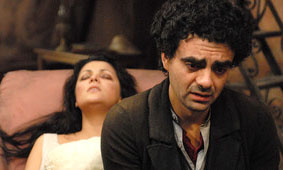 It has become a cliché to hail the wonders of American TV drama while lobbing grenades at our homemade output, but I had the feeling the balance was tipping back the other way a little during 2010. A factor in this must be the determination by the new ITV management team of Adam Crozier and Archie Norman that ITV should make more original drama, with a particular view towards creating long-running, returning series which can be sold into overseas markets. Obviously there's hard-boiled commercial thinking underpinning this, but if it brings us more work as instantly memorable as Downton Abbey, who's complaining? Otherwise ITV's output was erratic - the remake of Bouquet of Barbed Wire reeked of moral squalor, the return of cop drama Whitechapel was absurd, and somebody seemed to have mislaid an episode of The Little House.
It has become a cliché to hail the wonders of American TV drama while lobbing grenades at our homemade output, but I had the feeling the balance was tipping back the other way a little during 2010. A factor in this must be the determination by the new ITV management team of Adam Crozier and Archie Norman that ITV should make more original drama, with a particular view towards creating long-running, returning series which can be sold into overseas markets. Obviously there's hard-boiled commercial thinking underpinning this, but if it brings us more work as instantly memorable as Downton Abbey, who's complaining? Otherwise ITV's output was erratic - the remake of Bouquet of Barbed Wire reeked of moral squalor, the return of cop drama Whitechapel was absurd, and somebody seemed to have mislaid an episode of The Little House.
But there's a sense that ITV is going to give it a good go, even if their Poirot/Miss Marple addiction is stubbornly resistant to treatment.
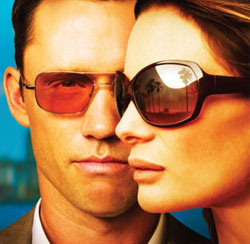 The best American shows, when they weren't Mad Men (now gone from BBC Four and heading for Sky 1) or the consistently impressive The Good Wife (C4), were often lurking in the margins. I became quite addicted to Burn Notice, a wry saga of a redundant spy (Jeffrey Donovan) trying to get his job back, but it's confusing tracking its progress between FX and Fiver (Jeffrey Donovan and Gabrielle Anwar in Burn Notice, pictured above right). Timothy Olyphant was - is - superb in the Elmore Leonard-inspired Justified (Five USA), and Eastbound & Down (FX) gradually exerts a kind of sleazeball charm. And then there was the delirious showbiz powder-puff of Glee, a high-school musical fantasy laced with the sulphuric acid of Coach Sue.
The best American shows, when they weren't Mad Men (now gone from BBC Four and heading for Sky 1) or the consistently impressive The Good Wife (C4), were often lurking in the margins. I became quite addicted to Burn Notice, a wry saga of a redundant spy (Jeffrey Donovan) trying to get his job back, but it's confusing tracking its progress between FX and Fiver (Jeffrey Donovan and Gabrielle Anwar in Burn Notice, pictured above right). Timothy Olyphant was - is - superb in the Elmore Leonard-inspired Justified (Five USA), and Eastbound & Down (FX) gradually exerts a kind of sleazeball charm. And then there was the delirious showbiz powder-puff of Glee, a high-school musical fantasy laced with the sulphuric acid of Coach Sue.
Meanwhile back at the BBC, they hit the ball out of the park with the ingenious Sherlock, The Silence and Patrick Stewart's Macbeth, brought Jimmy McGovern back to the screen with Accused, and outperformed with Garrow's Law and the Battle of Britain drama First Light. Spooks continued to exhibit awesome pulling-power, and BBC Three's lesbian series Lip Service has quietly become a major success story.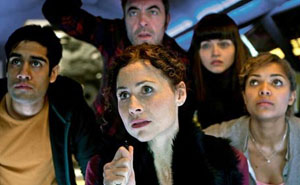 However, corporate misfires included the hilarious underwater saga The Deep (pictured left) and the David Tennant vehicle, Single Father. They cast Idris Elba, who is brilliant, in Luther, which wasn't. And it was impossible to count the number of times they repeated Lennon Naked, Christopher Eccleston's exhaustingly leaden impersonation of the slaughtered Beatle. The BBC makes far more of everything than anybody else and can experiment with different approaches, so you'd expect a few bumps in the road, but they must squint enviously at those lush middle-market pastures grazed so effortlessly by Downton Abbey. That will be the mission for the new Upstairs Downstairs, if they're prepared to give it a full-scale series, but the fact that they're having to resurrect a 40-year-old classic to do it speaks volumes.
However, corporate misfires included the hilarious underwater saga The Deep (pictured left) and the David Tennant vehicle, Single Father. They cast Idris Elba, who is brilliant, in Luther, which wasn't. And it was impossible to count the number of times they repeated Lennon Naked, Christopher Eccleston's exhaustingly leaden impersonation of the slaughtered Beatle. The BBC makes far more of everything than anybody else and can experiment with different approaches, so you'd expect a few bumps in the road, but they must squint enviously at those lush middle-market pastures grazed so effortlessly by Downton Abbey. That will be the mission for the new Upstairs Downstairs, if they're prepared to give it a full-scale series, but the fact that they're having to resurrect a 40-year-old classic to do it speaks volumes.
Coming in 2011
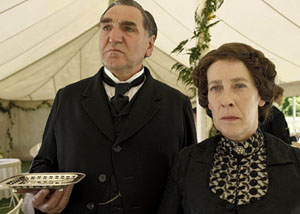 Downton Abbey series 2 Spurned by London society following her disgraceful behaviour with the dead Turk, Lady Mary becomes a nursing heroine on the Western Front, where she tends the cultured and debonair Count von Schumacher in a field hospital. Love blossoms among the Flanders poppies, even though the Count only has one hand and wears an eye patch behind his monocle. However, as the nation staggers into the post-war hangover, Mary's father, Lord Grantham, is distraught at the prospect of a German inheriting the estate. Seeing his master's anguish, his loyal valet Bates arranges a shooting accident for von Schumacher on the grousemoor, but Bates is grassed up to the police by the embittered footman Thomas. Cousin Matthew, although he has never lost his feelings for Lady Mary, defends Bates at his murder trial, and seeks to give him a better alibi than "I'd rather not say, sir." Meanwhile Carson the butler (pictured above with Mrs Hughes the housekeeper) considers a job offer from Upstairs Downstairs.
Downton Abbey series 2 Spurned by London society following her disgraceful behaviour with the dead Turk, Lady Mary becomes a nursing heroine on the Western Front, where she tends the cultured and debonair Count von Schumacher in a field hospital. Love blossoms among the Flanders poppies, even though the Count only has one hand and wears an eye patch behind his monocle. However, as the nation staggers into the post-war hangover, Mary's father, Lord Grantham, is distraught at the prospect of a German inheriting the estate. Seeing his master's anguish, his loyal valet Bates arranges a shooting accident for von Schumacher on the grousemoor, but Bates is grassed up to the police by the embittered footman Thomas. Cousin Matthew, although he has never lost his feelings for Lady Mary, defends Bates at his murder trial, and seeks to give him a better alibi than "I'd rather not say, sir." Meanwhile Carson the butler (pictured above with Mrs Hughes the housekeeper) considers a job offer from Upstairs Downstairs.
David Hasselhoff becomes a judge on the new series of The X Factor.
In Death by Chocolate (ITV1), Hercule Poirot is found dead after eating a hundredweight of Belgian chocolates. Miss Marple investigates.
The Other Way is Gloucestershire (BBC Two) is a "modified-reality" exposé of the explosive emotions that seethe beneath the surface of Lower Bibblebury in the Cotswolds. In Week One, we eavesdrop on retired commodities broker Gareth and his wife Lucinda as they plot to asset-strip Mrs Chumleigh's Homemade Jams & Preserves Emporium and drive Mr Yates, the butcher, out of business.
Silk is BBC One's new legal drama starring Maxine Peake and Rupert Penry-Jones, and written by Peter Moffat.















Add comment